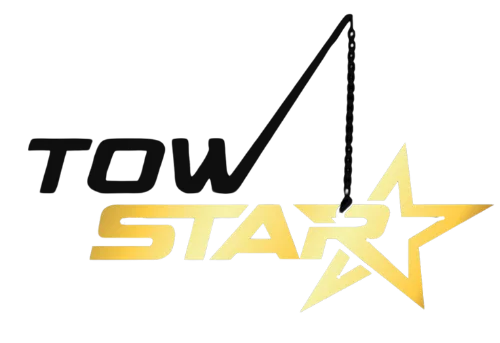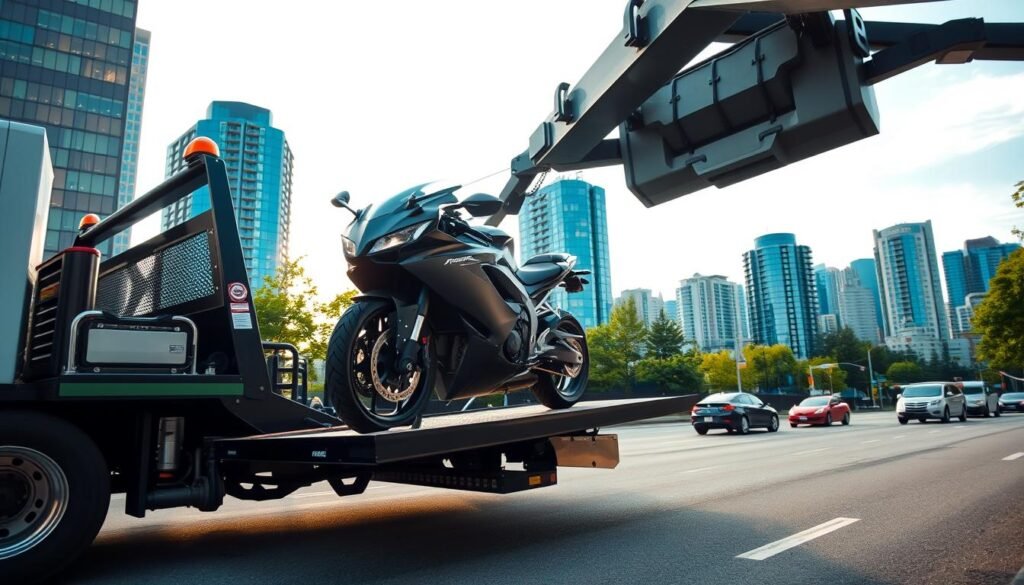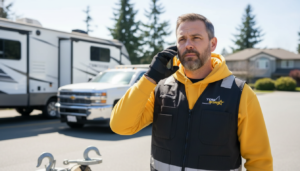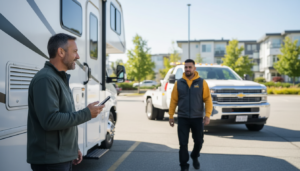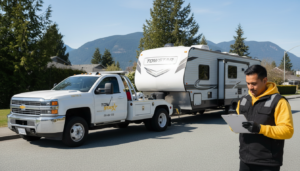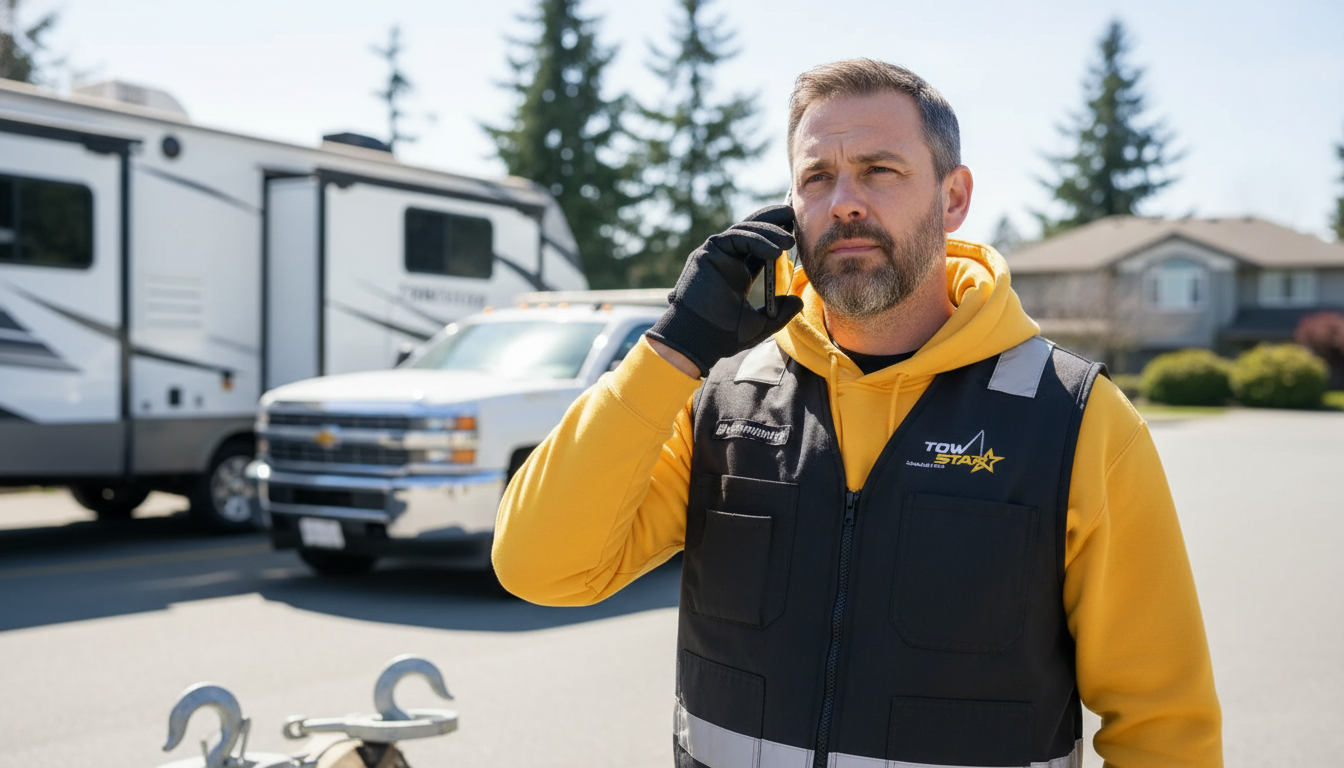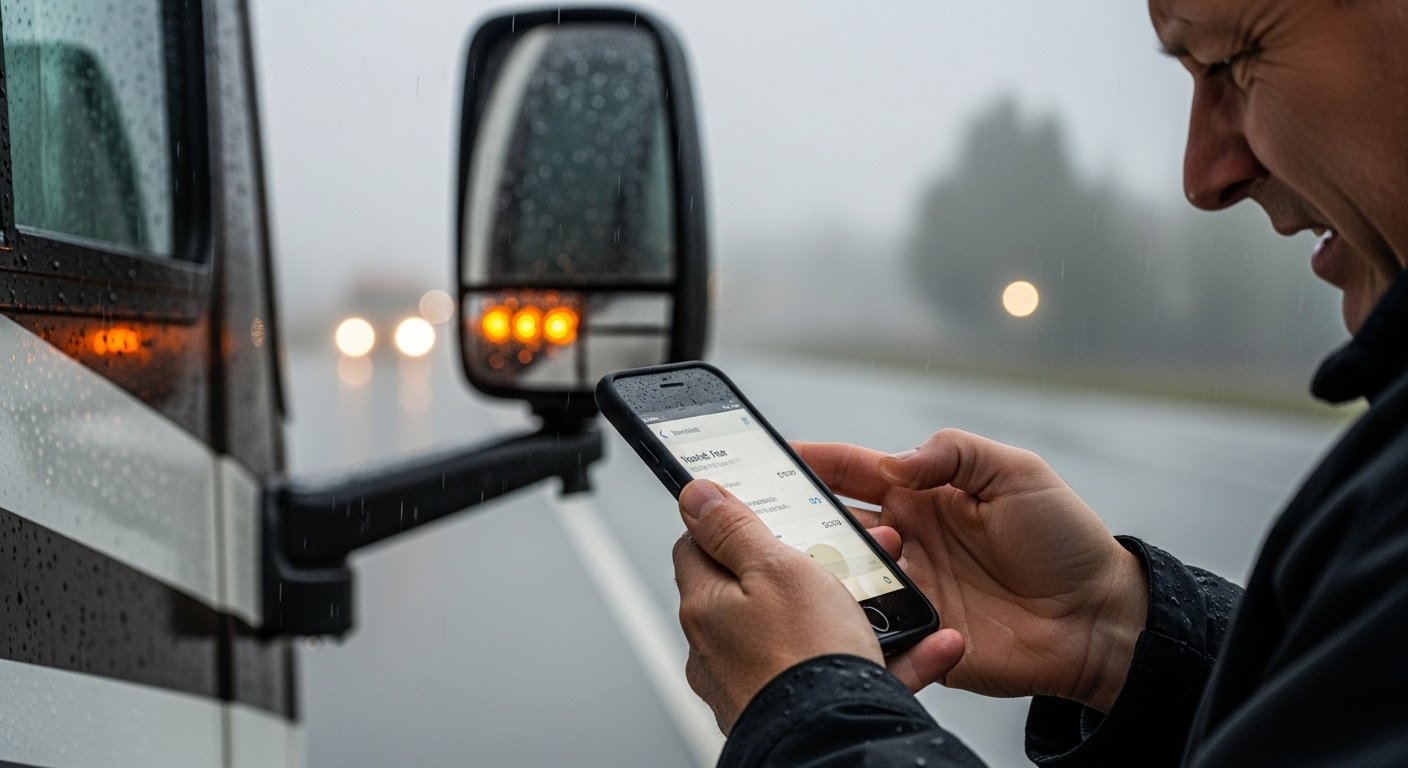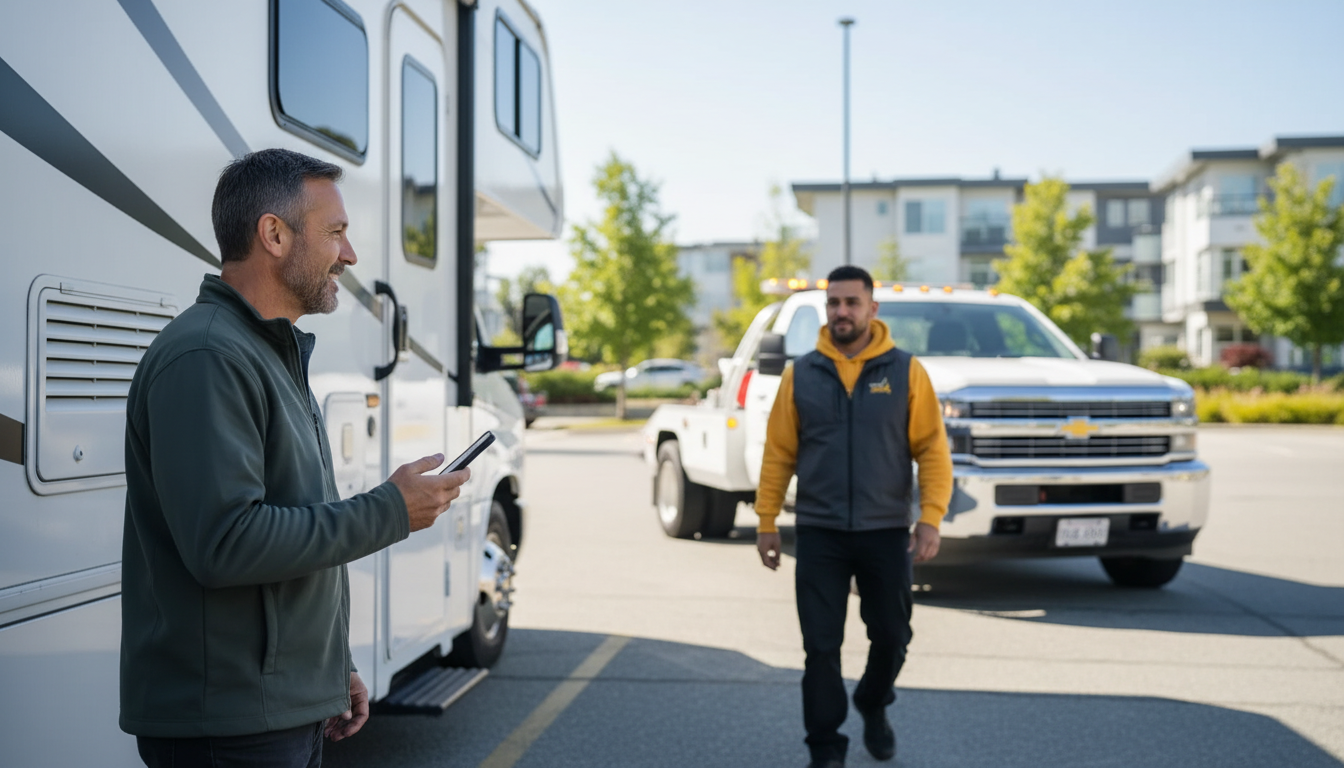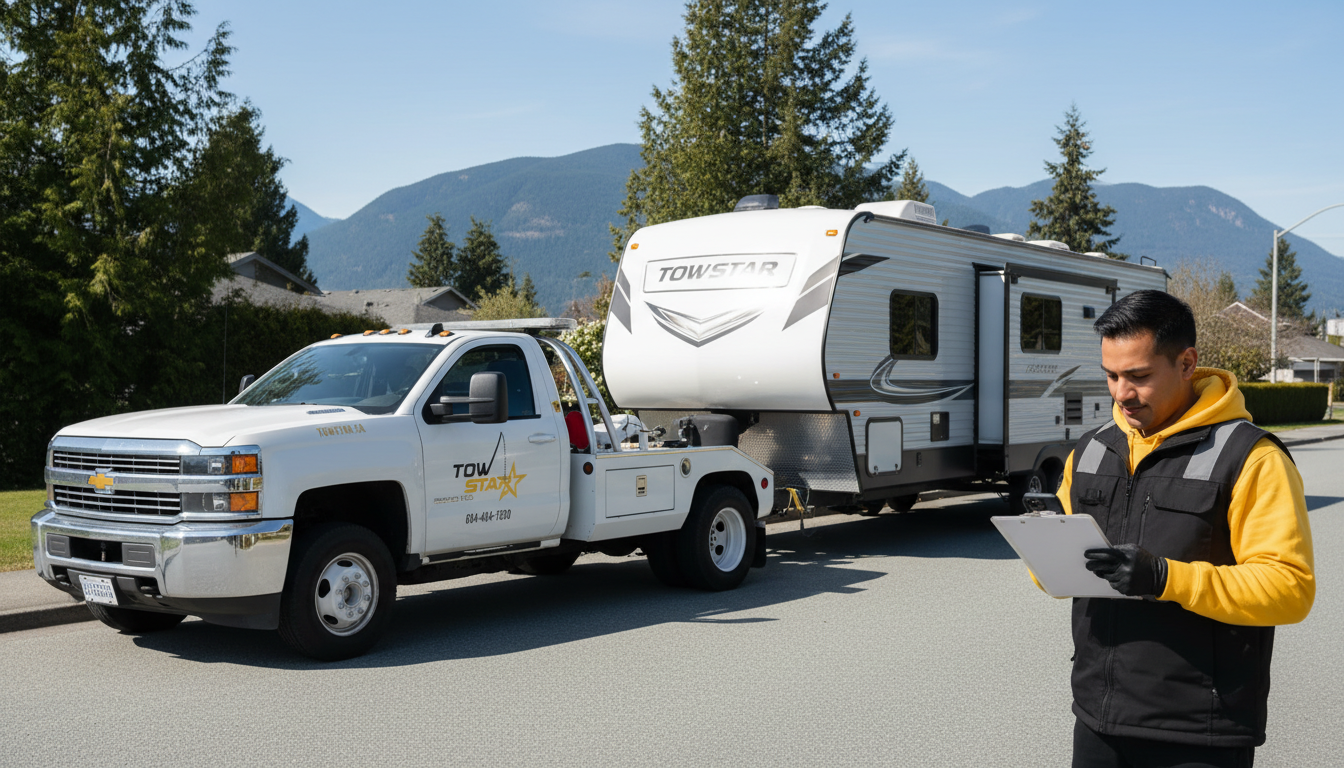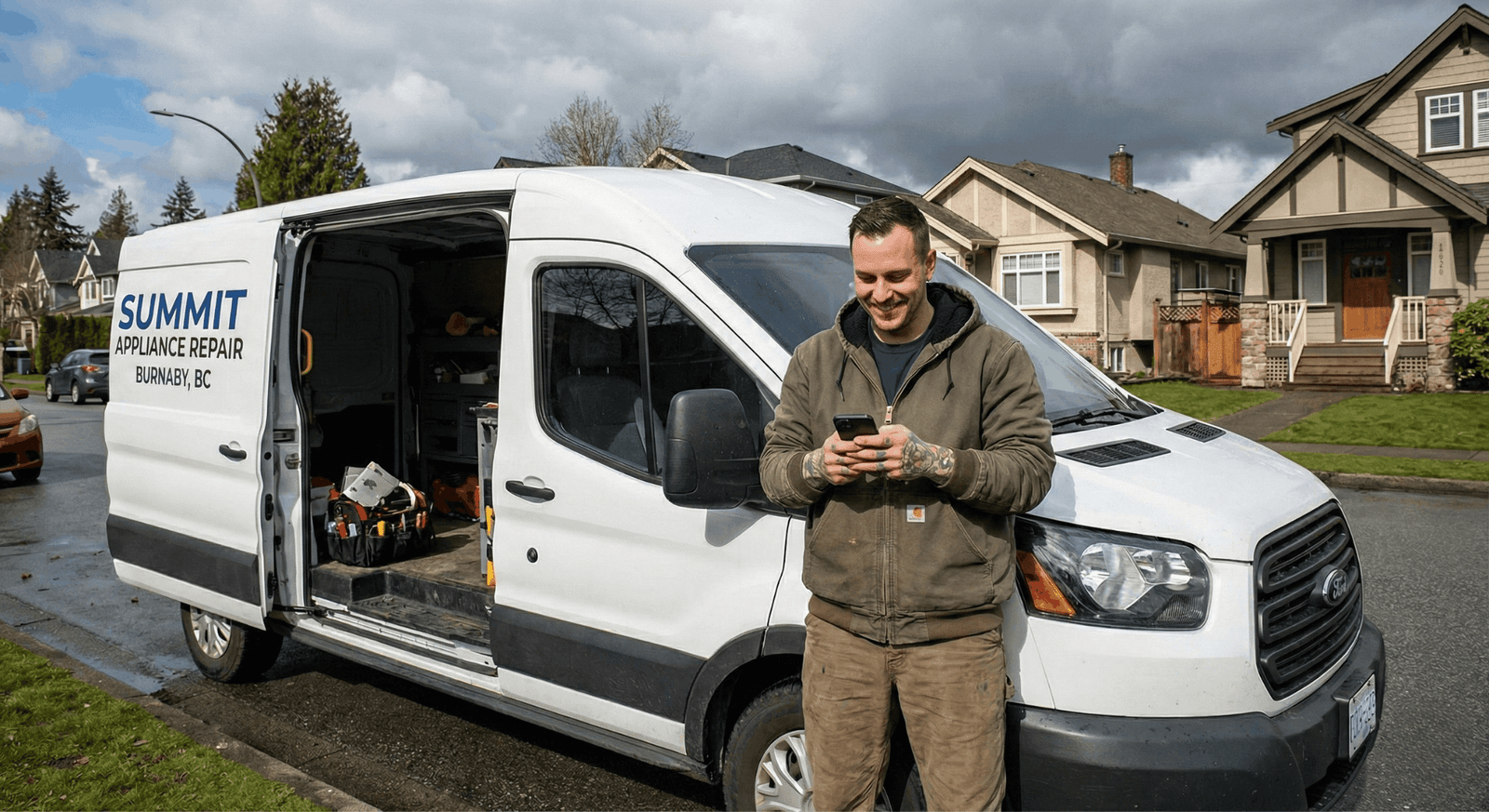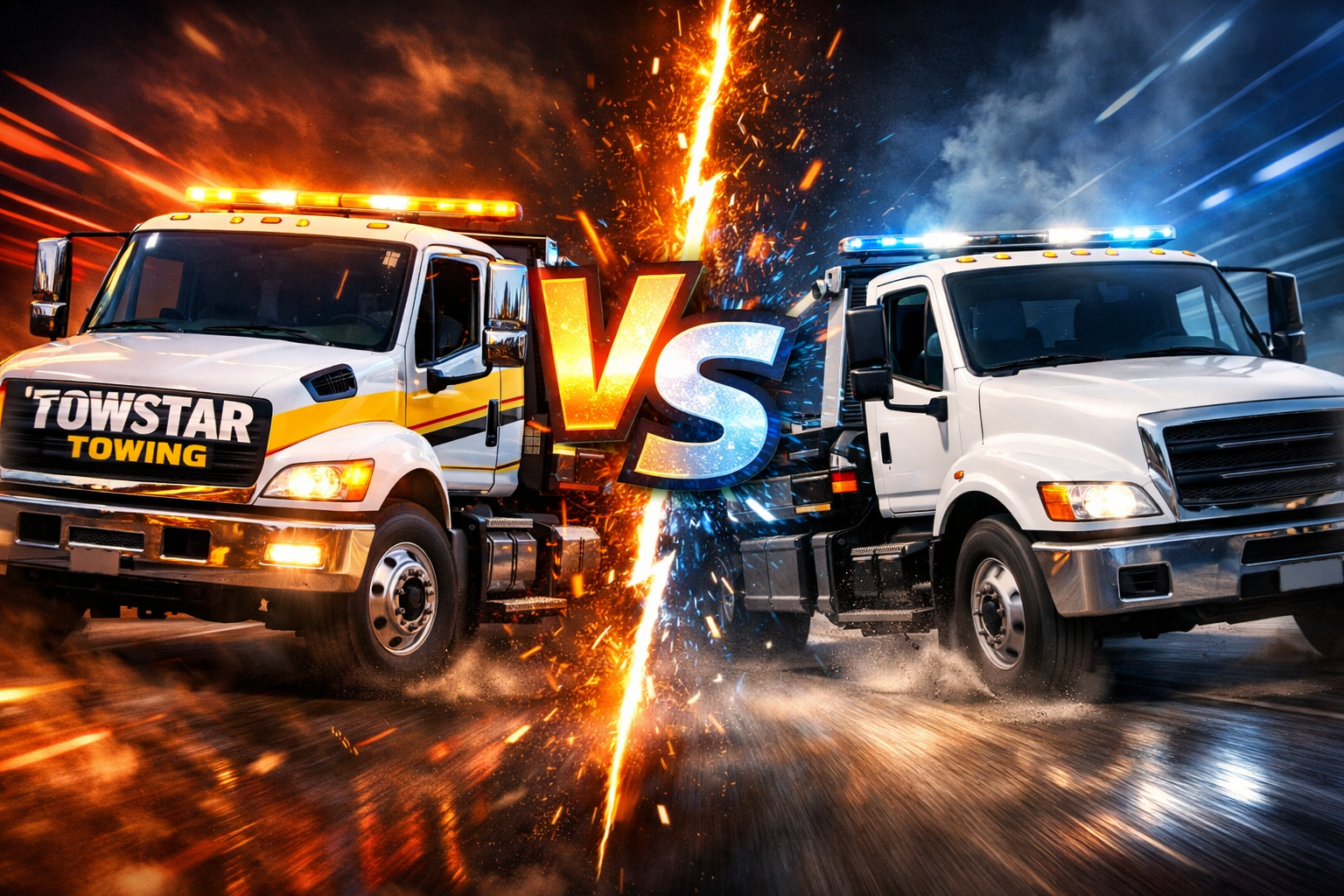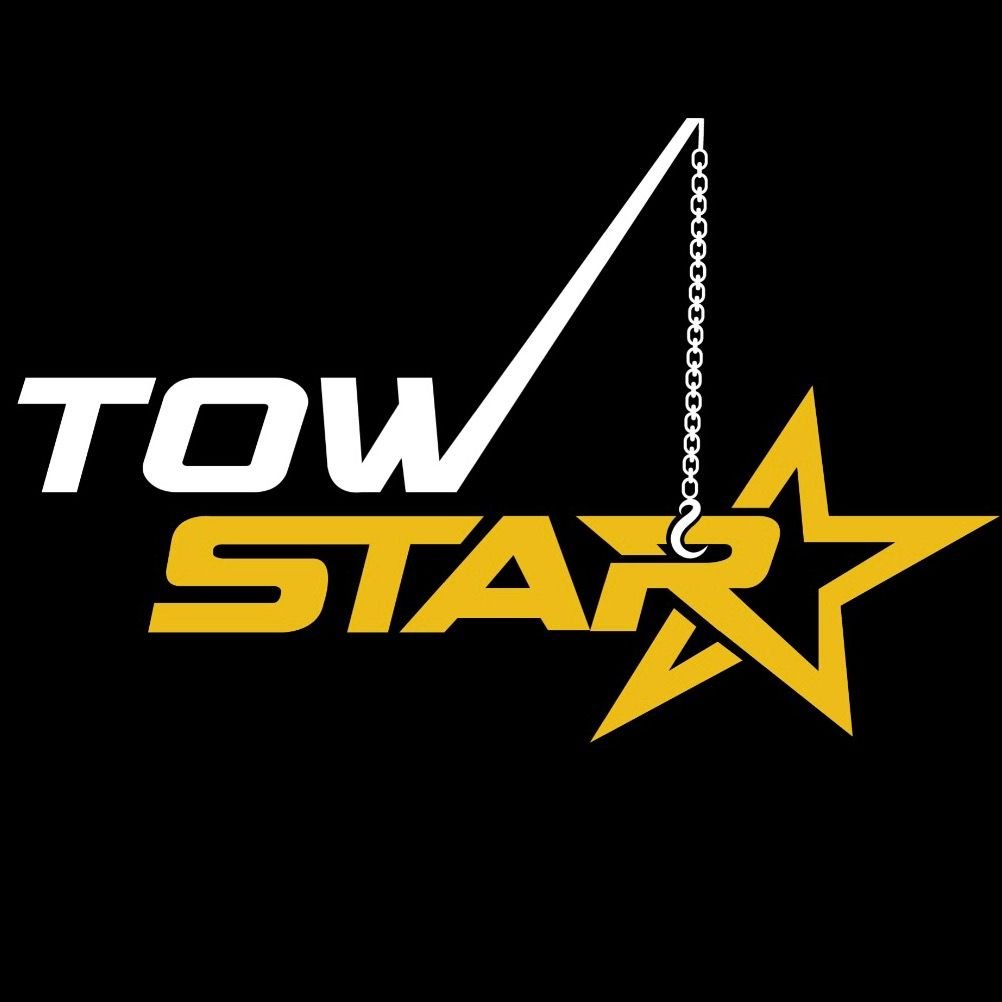If you ride a motorbike in Vancouver, you know the joy of the open road. But, you also need to know the laws, like those for towing. It’s important for your safety and others on the road.
Knowing the safety laws and towing rules is key. It doesn’t matter if you’ve been riding for years or just started. It’s vital to understand these laws.
Learning the main towing rules in Canada helps you follow the law. It also keeps you safe on the road.
Key Takeaways
- Understand the licensing requirements for motorbike towing in Canada.
- Familiarize yourself with the safety precautions necessary for motorcycle hauling.
- Know the equipment needed for safe towing practices.
- Be aware of the regulations specific to Vancouver riders.
- Stay informed about the laws governing motorbike towing to ensure a safe riding experience.
Overview of Motorbike Towing in Canada
As a motorcyclist in Canada, knowing the laws about bike transport is key. It makes riding safer and easier. Motorbike towing, for fun or moving, has many rules that change by province.
Importance of Understanding Towing Laws
It’s vital for motorcyclists to know towing laws. This helps avoid legal trouble and keeps everyone safe. Knowing the rules can also save you from fines and accidents.
For example, some places have rules on what equipment you can use. Knowing these can help you tow your bike safely and legally.
Differences Across Provinces
Canada’s provinces have their own towing rules. In British Columbia, there are special guidelines for towing a motorcycle. This includes using the right equipment and making sure the bike is secure.
Ontario, on the other hand, might have different rules. It’s important for riders to know the laws in each province they visit or live in.
Common Misconceptions
There are many myths about towing motorcycles in Canada. One is that the laws are the same everywhere, which is not true. Another is that towing a bike is simple and doesn’t need much knowledge.
But towing a motorcycle is complex. It requires careful planning, the right gear, and knowing the law. Learning about these can make towing safer and more legal.
Towing Regulations Specific to Vancouver
If you ride a motorcycle in Vancouver, knowing the towing rules is key. The city has its own set of guidelines for towing. Following these rules helps you avoid fines and stay safe on the road.
Local Motoring Authority Guidelines
The local motoring authority in Vancouver has rules for towing trailers or other vehicles. These rules are to keep everyone safe on the roads. You can find these guidelines on the official website of the Motor Vehicle Branch in British Columbia.
Required Equipment for Towing
When you tow, you need the right gear for safety. This includes a tow bar, safety chains, and electric brakes if the trailer is heavy. Also, make sure the tow hitch and wiring for the trailer’s lights fit properly.
| Equipment | Description | Requirement |
|---|---|---|
| Tow Bar | A rigid bar that connects the motorcycle to the trailer | Mandatory |
| Safety Chains | Chains that provide additional security in case the tow bar fails | Mandatory |
| Electric Brakes | Brakes that activate automatically when the motorcycle brakes | Required for trailers over 450 kg |
| Tow Hitch | A device that attaches to the motorcycle frame to connect the tow bar | Mandatory |
| Trailer Lights | Lights on the trailer that are synchronized with the motorcycle’s lights | Mandatory |
Prohibited Towing Methods
Some towing methods are banned in Vancouver for safety reasons. Towing with a rope or chain without safety measures is not allowed. Also, towing too fast or without securing the trailer properly is banned.
By sticking to these guidelines and using the right equipment, you can tow safely in Vancouver.
Licensing and Insurance Requirements
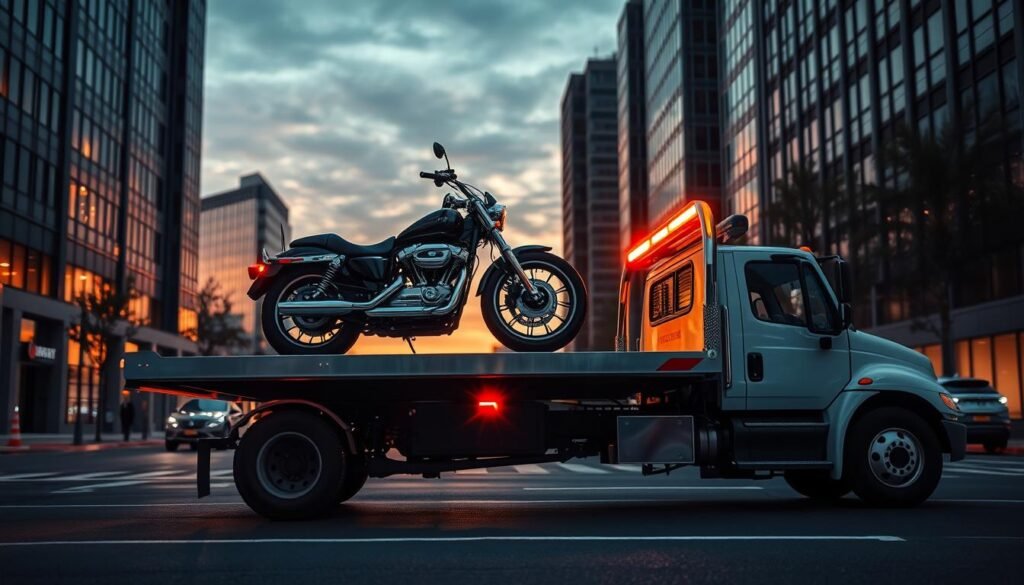
In Vancouver, motorcyclists need to know about licensing and insurance for towing. Having the right credentials and coverage is not just legal. It also gives you peace of mind while riding.
Valid Motorcycle License for Towing
In Canada, you need a valid motorcycle license to tow. The type of license depends on the motorcycle’s weight and type. Usually, a Class 6 license is enough. But, always check with local authorities for the latest info.
To get a motorcycle license, you must pass a written and riding test. Some places also require a motorcycle safety course. Having the right license is key to avoid fines and penalties.
Insurance Coverage Essentials
Insurance is vital for towing a motorcycle. You need liability insurance to cover damages to others in an accident. Also, consider coverage for theft, vandalism, or damage to your motorcycle.
When picking an insurance policy, tell your insurer you plan to tow your motorcycle. Not telling them could mean your claim is denied in an accident. Some insurers offer special towing coverage, including roadside assistance, which is very helpful in emergencies.
Consequences of Inadequate Insurance
Not having enough insurance can be very bad. If you’re in an accident and not insured, you could have to pay for damages or injuries. This could be very expensive and might even lead to legal trouble.
Also, not having the right insurance can affect your ability to ride. You might get fines or have your license taken away. So, it’s important to check your insurance often and make sure it covers towing, including flatbed towing.
With the right license and insurance, you can tow your motorcycle safely. You’ll know you’re following Canadian laws and are protected.
Safety Precautions When Towing
When towing a motorcycle, safety is key to avoid accidents and ensure a smooth ride. As a responsible motorcyclist, you know the importance of safety precautions. We’ll look at key safety measures, including proper weight distribution, the right towing accessories, and pre-towing safety checks.
Proper Weight Distribution
Proper weight distribution is vital for stability and control when towing a motorcycle. Make sure the motorcycle’s weight is evenly spread on the towing vehicle or trailer. This can be done by positioning the motorcycle correctly and securing it firmly.
Improper weight distribution can cause swaying or loss of control, which is dangerous on uneven terrain or sharp turns. To avoid this, follow these tips:
- Position the motorcycle in the center of the towing vehicle or trailer.
- Use straps or tie-downs to secure the motorcycle firmly.
- Avoid overloading the towing vehicle or trailer.
Using Proper Towing Accessories
Choosing the right towing accessories is essential for safe and secure motorcycle towing. The type of accessories needed depends on the towing method and the motorcycle type. Some essential towing accessories include:
| Accessory | Description | Benefits |
|---|---|---|
| Towing straps | Heavy-duty straps designed for securing motorcycles. | Prevents damage to the motorcycle and ensures secure towing. |
| Wheel chocks | Devices that prevent the motorcycle from rolling or shifting. | Enhances stability and safety during towing. |
| Towing dollies | Specialized dollies designed for towing motorcycles. | Reduces wear on the motorcycle’s tires and improves towing stability. |
When picking towing accessories, think about the motorcycle type, towing method, and terrain. High-quality towing accessories can greatly improve your towing experience.
Safety Checks Before Towing
Before towing your motorcycle, do a series of safety checks. These include:
- Inspecting the towing vehicle or trailer for any damage or wear.
- Verifying that the motorcycle is properly secured and balanced.
- Checking the towing accessories for any signs of damage or wear.
- Ensuring that all lights and signals are functioning correctly.
By following these safety precautions and doing regular checks, you can reduce the risk of accidents. Whether you’re using a bike breakdown service or motorbike wrecker service, safety should always be your top priority.
Common Towing Scenarios for Motorcyclists
It’s important for motorcyclists to know about towing scenarios for safety. You might need to tow a trailer, go off-road, or face emergencies.
Towing Trailers: What You Need to Know
Towing a trailer with your motorcycle needs planning and the right gear. Think about the trailer’s weight and size, and what you’re carrying.
- Make sure your motorcycle can handle the trailer’s weight.
- Use strong towing equipment, like a sturdy hitch and safety chains.
- Spread the trailer’s weight evenly.
Off-Road Towing Considerations
Off-road towing is tough, with rough terrain and unpredictable weather. You need the right gear and knowledge.
- Pick the right tires for your motorcycle and trailer.
- Use a winch or other recovery tools if needed.
- Travel with a friend whenever you can.
Emergency Towing Situations
In emergencies, like breaking down or being in an accident, knowing how to tow safely is key.
- Use towing equipment made for motorcycles.
- Make sure the motorcycle is securely attached to the towing vehicle.
- Get professional help if you’re not sure.
Knowing about towing scenarios and being ready makes motorcycling safer and more fun. Whether towing a trailer, going off-road, or facing an emergency, being prepared is essential.
Penalties for Violating Towing Laws
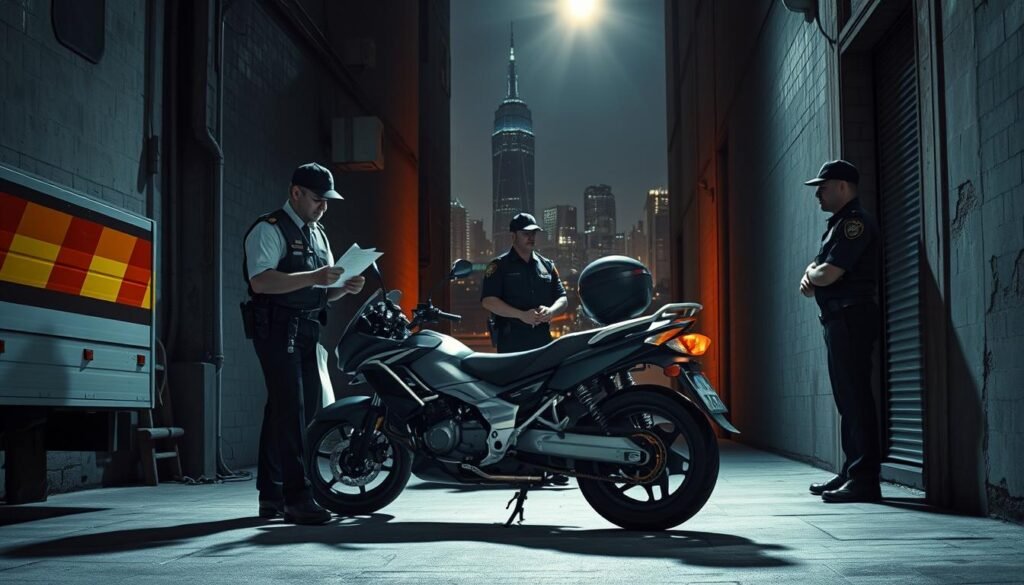
Towing laws are in place for a reason. Violating them can lead to big fines and more. As a motorcyclist in Vancouver, you risk your safety and face legal trouble if you don’t follow the rules.
Fines and Fees
Fines for breaking towing laws can be high. For example, not following bike transport or cycle relocation rules can cost $100 to $500 or more. This depends on how serious the offense is.
You might also have to pay to get your motorcycle back if it’s impounded. These fees can quickly add up, making ignoring the laws even more expensive.
Potential Legal Consequences
Breaking towing laws can lead to serious legal issues. You might face charges that need a court appearance.
- Potential court costs
- Legal fees for representation
- Possible increase in insurance premiums
Impact on Driving Record
Violating towing laws can also hurt your driving record. You might get demerit points on your license. These points can lead to:
- Suspension of your driver’s license
- Increased insurance rates
- Mandatory driving courses
Following towing laws is important. It’s not just about avoiding fines. It’s also about keeping your driving record clean.
Motorbike Towing Equipment: What to Choose
Choosing the right equipment for towing a motorbike is key for safety. It’s not just about moving a vehicle. It’s about keeping everyone on the road safe.
The right gear makes a big difference. It prevents damage, lowers accident risks, and makes towing easier.
Essential Towing Gear
You’ll need some basic towing gear to start. This includes:
- A sturdy tow bar or tow dolly made for motorbikes
- Strong towing straps or chains for your bike’s weight
- A reliable winch or recovery system for securing the bike
- Safety chains or secondary restraints to keep the bike in place
Each piece is vital for safe towing. A good tow bar or dolly spreads the weight right, easing the load on both the bike and the tow vehicle.
Recommended Accessories for Safe Towing
There are also accessories that boost towing safety and ease. These include:
- Towing mirrors for better visibility
- A towing light board to make your bike visible
- A wheel chock or bike stand for securing the bike
- A protective cover or tarp to shield the bike from weather
These extras not only up safety but also protect your bike from damage while moving.
Brands to Consider
Choosing reliable brands is important for towing gear. Some top brands are:
- Ramada
- Master Tow
- ROADMASTER
- Curt
These brands have a variety of products for different towing needs. They range from basic tow bars to advanced recovery systems.
By picking the right gear and accessories, towing becomes safer and more successful. Always do your research, read reviews, and ask experts for advice on what’s best for you.
Tips for New Motorcycle Towers
For new motorcycle fans, knowing how to tow is key for a safe ride. As you begin, learning the best ways and tips is important. This will help you get ready for your journey.
Securing Your Load
It’s important to secure your motorcycle to avoid damage while towing. Here are some tips to keep in mind:
- Use high-quality straps or tie-downs made for motorcycles.
- Make sure the motorcycle is safely placed on the towing vehicle, like a motorcycle flatbed towing trailer.
- Check that all straps are tight and the motorcycle is steady.
Pre-Towing Preparation
Before you go, make sure you’ve done the following:
- Check your towing gear for any wear or damage.
- Make sure your motorcycle is securely attached to the towing vehicle.
- Look at the weather forecast and plan your route.
- Have the right tools and emergency supplies with you.
Ongoing Education
To keep getting better at towing, consider these resources:
- Online tutorials and videos on towing techniques.
- Local motorcycle safety courses that teach towing.
- Community forums and groups to share and learn from others.
By following these tips and learning more, you’ll become more confident and skilled in towing your motorcycle.
Community and Advocacy Groups in Vancouver
As a motorcyclist in Vancouver, you know how important safety is on the roads. But have you thought about the role of community and advocacy groups? These groups help educate riders, promote safe riding, and fight for motorcyclists’ rights.
Organizations Promoting Motorcycle Safety
Vancouver has many groups focused on motorcycle safety. They work hard to give motorcyclists resources, support, and education. You’ll find local motorcycle clubs, safety groups, and riding schools here.
These groups team up with local authorities to improve road safety. They also let motorcyclists share their stories, learn from each other, and stay up-to-date on safety tips.
Events and Training Opportunities
Throughout the year, Vancouver has many events and training programs for motorcyclists. You can find safety workshops, riding courses, charity rides, and community gatherings. These events are great for improving your skills, learning about new safety tech, and meeting other riders.
- Riding courses for beginners and advanced riders
- Safety workshops focusing on defensive riding techniques
- Charity rides that bring the motorcycle community together
How to Get Involved
Getting involved with Vancouver’s motorcycle community is simple. Start by looking up local motorcycle clubs and advocacy groups online. Many have websites or social media groups with updates on events and meetings.
Also, check out local motorcycle events like bike shows, racing, or charity rides. These are great places to meet other riders and find groups that match your interests. Taking a riding course or safety workshop is another way to improve your skills and meet others.
By joining the motorcycle community, you’ll make your riding better and help make the roads safer for everyone in Vancouver.
The Future of Motorbike Towing in Canada
Canada’s motorbike towing sector is set for a big change. This is thanks to new laws and tech advancements. As more people ride motorcycles, it’s key to know about these updates. Whether you’re a pro or new to towing, keeping up with the latest news is important.
Changes in Legislation
Canada’s laws on towing motorcycles are about to change a lot. Provinces are making rules clearer for riders to tow their bikes anywhere. New rules will cover what towing gear you need and how to stay safe.
It’s important to follow these new rules. This includes using the right towing gear and making sure your bike is secure. Knowing and following these rules helps avoid fines and keeps you safe.
Increasing Popularity of Motorcycle Towing
More people in Canada are into towing their motorcycles. This is because of the rise in motorcycle tourism and adventure travel. Towing your bike to different places is now easier, thanks to better services and gear.
For those looking into towing services, Towstar’s guide to Coquitlam towing is a great resource. It offers tips and information on the best towing services.
Innovative Towing Solutions
New tech and gear are making towing safer and easier. This includes advanced towing equipment and special trailers for motorcycles. For example, some companies are introducing GPS tracking for towed bikes, adding extra security.
As the industry grows, we’ll see even more helpful and secure towing options. Keeping up with these updates will help riders use the latest towing tech.
Final Thoughts on Motorbike Towing in Vancouver
When you ride your motorbike in Vancouver, knowing the towing laws is key. Whether you’re moving your bike or towing a trailer, it’s important to follow the rules. This ensures a safe and easy trip.
Key Takeaways for Safe Towing
First, learn about the towing rules in your area. Make sure your motorcycle is ready for towing. Always check your towing equipment before you go.
This means your bike transport or cycle relocation setup must be safe and follow Vancouver’s towing laws.
Promoting Responsible Riding and Towing
You help keep the roads safe by following these guidelines. By staying informed, you help make Vancouver’s roads safer for everyone.
Resources for Further Guidance
For more details on towing your motorbike in Vancouver, talk to local motoring authorities. The Insurance Corporation of British Columbia is a good place to start. You can also join local motorcycle groups to keep up with the latest tips and rules.
FAQ
What are the licensing requirements for towing a motorcycle in Canada?
To tow a motorcycle in Canada, you need a valid motorcycle license. The specific requirements may vary depending on the province or territory you’re in. It’s essential to check with your local motoring authority for the most up-to-date information.
What safety precautions should I take when towing a motorcycle?
When towing a motorcycle, ensure proper weight distribution and use proper towing accessories. Conduct safety checks before towing. Be aware of your vehicle’s towing capacity and the motorcycle’s weight.
What is the proper way to secure a motorcycle for towing?
Use a motorcycle trailer or a tow dolly to secure a motorcycle for towing. Ensure the motorcycle is properly strapped and secured. Check the motorcycle’s tie-downs and ensure they’re not damaged or worn out.
Can I tow a motorcycle with a regular driver’s license?
In most provinces, a regular driver’s license is not sufficient for towing a motorcycle. You typically need a motorcycle license or an endorsement on your driver’s license. It’s best to check with your local motoring authority for specific requirements.
What are the consequences of violating towing laws in Canada?
Violating towing laws in Canada can result in fines, fees, and legal consequences. You may face penalties, such as points on your driving record, and increased insurance premiums.
How do I choose the right towing equipment for my motorcycle?
Consider the type of motorcycle, its weight, and your vehicle’s towing capacity when choosing towing equipment. Research recommended accessories for safe towing, such as tow dollies, straps, and tie-downs.
Are there any specific regulations for towing a motorcycle in Vancouver?
Yes, there are specific regulations for towing a motorcycle in Vancouver. Familiarize yourself with local motoring authority guidelines, required equipment for towing, and prohibited towing methods to ensure compliance.
What should I do in case of a motorcycle breakdown or emergency towing situation?
In case of a motorcycle breakdown or emergency towing situation, call a professional motorcycle towing service. They will provide the necessary assistance and get you back on the road safely.
How can I stay informed about changes in motorbike towing laws and regulations?
Stay informed about changes in motorbike towing laws and regulations by checking with your local motoring authority. Attend motorcycle safety courses and join motorcycle advocacy groups in Vancouver.
